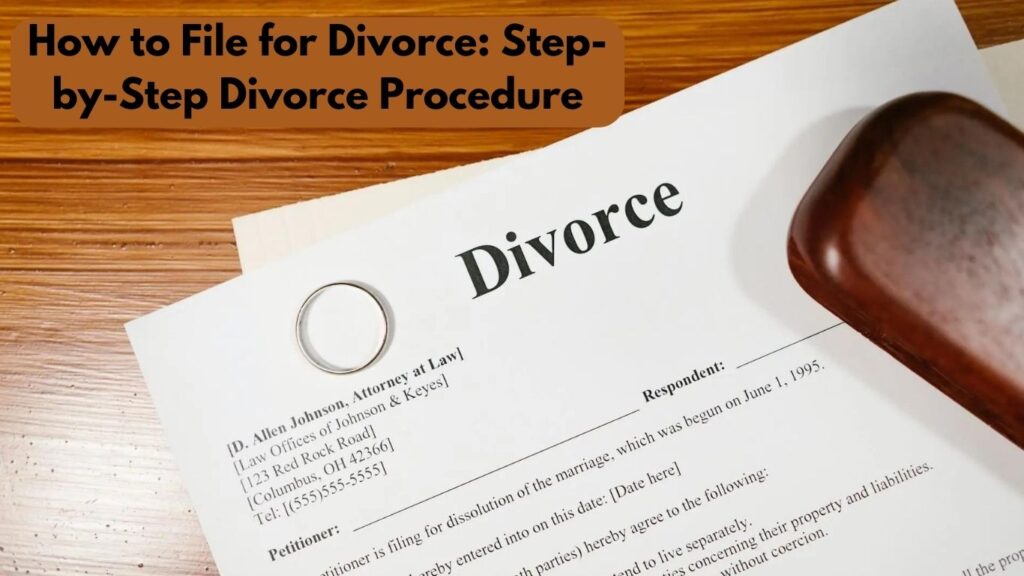
How to File for Divorce: Step-by-Step Divorce Procedure: Divorce, once a rarity in Hindu law, has become a viable solution for couples facing irreconcilable differences. Governed by the Hindu Marriage Act, 1955, divorce proceedings for Hindus, Buddhists, Sikhs, and Jains in India are divided into two main categories: Mutual Consent Divorce and Contested Divorce. In this article, we delve into the detailed process of each, shedding light on the legal procedures and grounds for divorce under Hindu law.
Navigating the Legal Landscape: Step-by-Step Divorce Procedure under Hindu
Mutual Consent Divorce: Under Section 13(b) of the Hindu Marriage Act, 1955, Mutual Consent Divorce offers a pathway for couples to dissolve their marriage amicably. The process unfolds as follows:
- Filing of the Petition: Both spouses collaborate to file a joint petition for divorce in the family court, signed by both parties.
- Court Appearance and Scrutiny of Petition: Both parties present themselves before the court, along with the petition and requisite documents. These documents encompass address proof, financial details, marriage certificate, evidence of residing separately for at least one year, income tax statements, property details, and evidence of failed reconciliation attempts.
- Recording of Statements: The court duly records statements from both spouses under oath.
- First Motion Order and Waiting Period: Upon scrutiny, the court issues a decree on the first motion, stipulating a mandatory six-month waiting period before the second motion can be filed. The maximum timeframe for filing the second motion is 18 months.
- Second Motion and Final Hearing: If reconciliation remains elusive during the waiting period, the second motion is filed. The court reserves the authority to waive the six-month waiting period if deemed appropriate. Failure to file the second motion within 18 months results in the court withholding the divorce decree.
- Decree of Divorce: Upon satisfaction of the veracity of the allegations and the impracticability of reconciliation, the court grants a decree of divorce.
Contested Divorce: Contested divorce unfolds when one party disputes the divorce or when specific grounds for divorce necessitate establishment. The procedural outline encompasses:
- Filing of the Petition: One party initiates the process by filing a petition for divorce in the relevant family court, citing grounds delineated in Section 13 of the Hindu Marriage Act, 1955.
- Scrutiny of the Petition: The court scrutinizes the petition during the initial hearing.
- Appearance of the Opposite Party: The opposing party is served a copy of the petition and a notice to appear in court.
- Mediation: The court endeavors to resolve the dispute through mediation, fostering a conducive environment for an amicable settlement.
- Recording of Evidence and Final Arguments: Both parties submit evidence and undergo cross-examination. Subsequently, final arguments are presented before the court.
- Final Decision: Upon careful consideration, if the court is satisfied, it grants a decree of divorce. Either party aggrieved by the decision retains the option to file an appeal within three months.
Grounds for Contested Divorce: Section 13 of the Hindu Marriage Act, 1955, elucidates grounds for contested divorce, encompassing adultery, cruelty, desertion, mental illness, among others.
The Law Firm Legal Eye: For comprehensive legal assistance and guidance throughout the divorce process, Legal Eye offers specialized services tailored to meet the unique needs of each client. With a team of seasoned legal professionals, we provide expert advice and support to ensure a smooth and equitable resolution.
Conclusion:
How to File for Divorce: Step-by-Step Divorce Procedure: Navigating the intricate landscape of divorce proceedings under Hindu law demands a thorough understanding of the legal intricacies and grounds for divorce. Whether opting for mutual consent or contested divorce, couples embarking on this journey must be equipped with the requisite knowledge and legal guidance to navigate through the process effectively.

